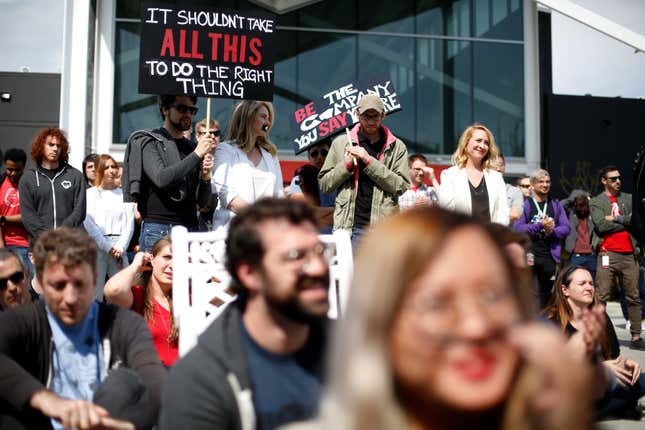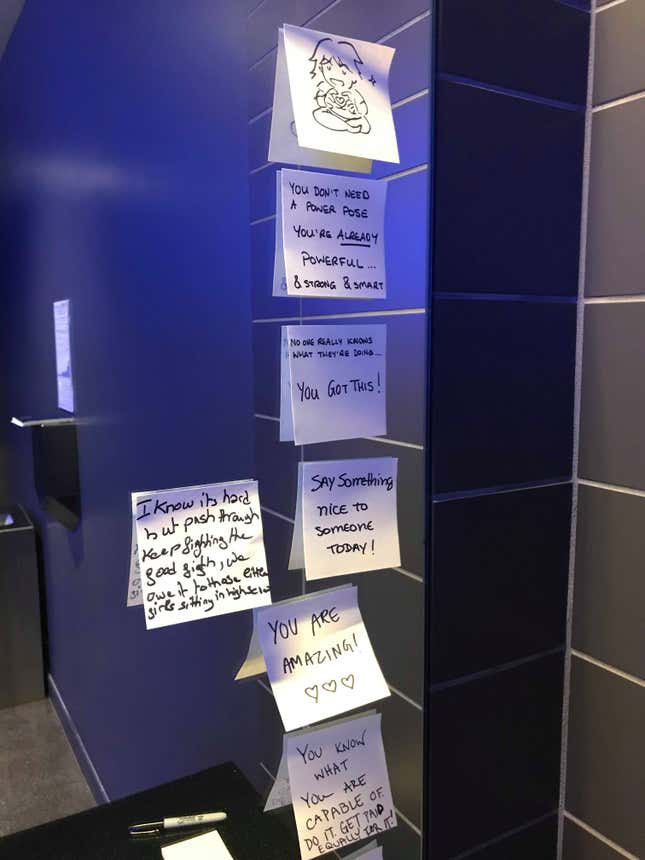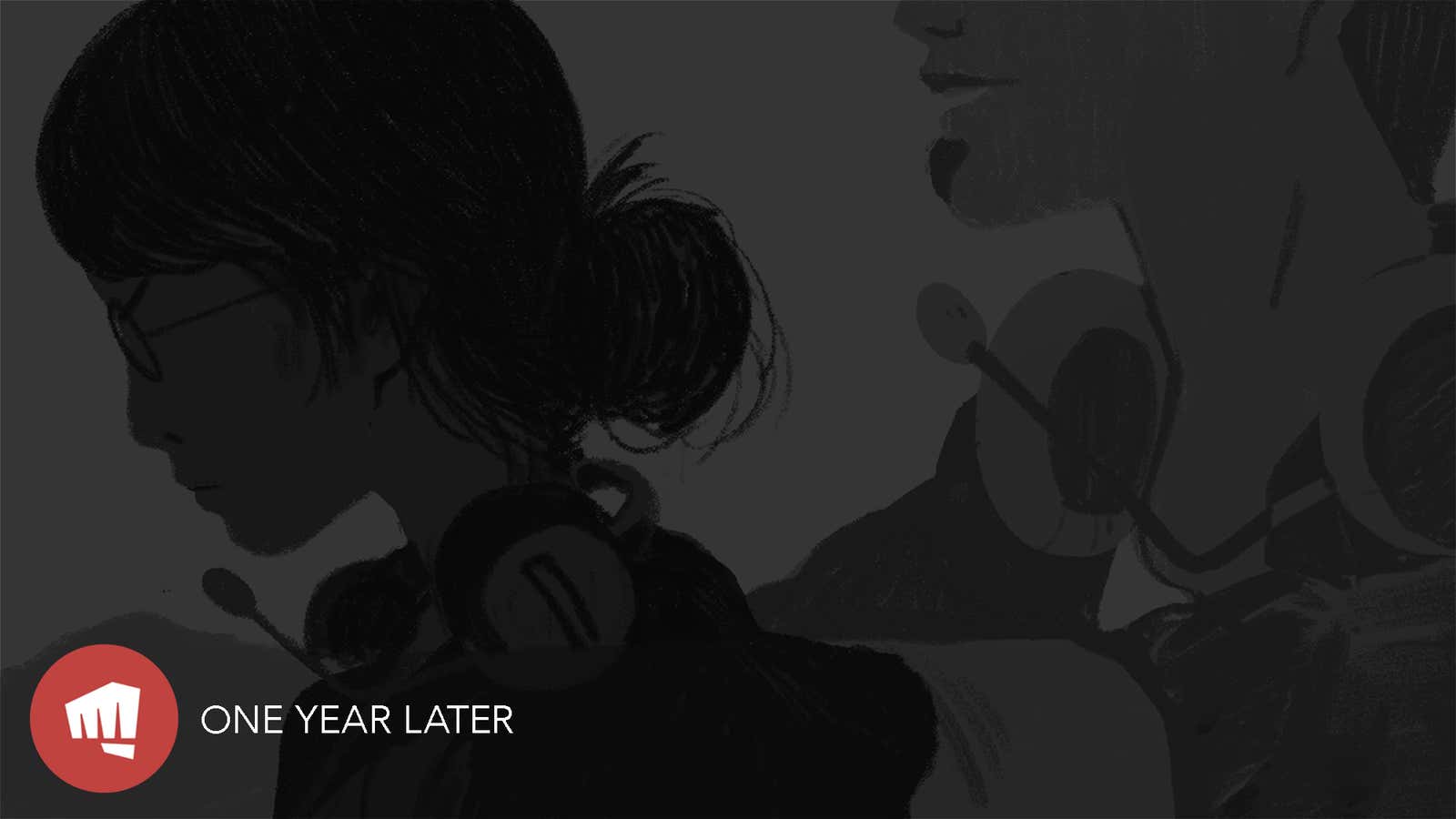In the year since Kotaku’s investigation into sexism at Riot Games, the 2,500-person company behind League of Legends, the company has crafted and self-injected its proposed antidote to its so-called “bro culture.”
Over the last week, 14 current or recent Riot employees spoke with Kotaku about the game company’s forward momentum toward equitable workplace conditions. Now that it’s all out in the open—the slanted hiring practices, the chauvinism, the ball-tapping frat antics—employees are witnessing the rollout of a belated justice. Everybody we spoke to was optimistic about the future of Riot Games, even as some at the company disagree on how best to implement cultural change.
“Has Riot done everything I would like them to do? No,” said one current employee who, like others, is anonymous for fear of their future in the game development industry. “Has Riot put in significant investment and shown commitment to want to be better? Yes, I do believe that.”
If there’s any one thing that characterizes the average Riot employee, it’s a deep devotion to the game company and the League of Legends multiverse it engineered. For some, that has meant loving Riot in spite of its flaws, initiating difficult conversations with colleagues, and pushing for change and accountability outside the bounds of corporate initiatives. For others, love for Riot has meant keeping their head down, making games and avoiding any more bad press.
Among Riot’s employees, there is a simmering dissent over whether Riot leadership and employees are going far enough in rooting out endemic sexism, or whether they’ve over-corrected and are no longer focused on supporting Riot’s core commodity: The League of Legends game, which in 2018, reportedly made over $1 billion.
In June, after it became known that California’s Department of Fair Employment and Housing was investigating Riot for alleged endemic sexism, some Riot employees pushed back, believing co-workers were secretly aiding the investigation. “We all recognize you are spending player dollars to bring Riot down,” one Riot employee wrote on the anonymous workplace messaging app Blind. “Stop saying you love Riot. It’s inauthentic and ugly.” The post received nine likes—not a groundswell of backlash, but a sign that reform is never easy and never without some dissent.
In 2018, a Kotaku investigation reported that women at Riot were regularly passed up for promotions for which they were qualified, interrupted or talked over in meetings or made to feel sexualized at the workplace. Some employees said they’d received pictures of male genitalia, while others alleged that Riot Games’ COO ball-tapped or farted on male employees. Several women described how, during Riot’s interviewing process, they felt their love for gaming or League of Legends was aggressively questioned, and that this skepticism over their being a “culture fit” or a “hardcore gamer” never went away throughout years of employment. Most sources were anonymous for fear of retaliation from colleagues, whom several described as “cultish” about Riot’s very specific culture. At the time the company was 81% male, according to an official Riot representative.
Several current and former female employees had told Kotaku that, until the article broke, they assumed their bosses’ or managers’ gendered or unfair treatment of them was an isolated workplace experience. Some individuals at the company were so demoralized by the widespread allegations in our report that they took time off or did not consistently work for days or weeks. Others looked for jobs elsewhere, sources say, and left. More stories of harassment or discrimination came out in blog posts. A wall of post-its expressing support for women at Riot manifested in a company bathroom.
Three weeks after the article was published, Riot issued its first public statement, an apology that pledged sweeping changes to address current and former employees’ allegations of sexism. That included hiring a Chief Diversity Officer and situating them in the highest rungs the company, deemphasizing hiring hardcore gamers over other qualified candidates and investigating or removing problem employees.
Today, one year after Kotaku’s initial report, all of this is, for the most part, the reality, sources say. On Tuesday, Angela Roseboro, Riot’s new Chief Diversity Officer, posted a blog on Riot’s website describing tangible progress the company has made to detoxify its internal culture: bringing two more women onto the 11-person leadership team (for a total of three), helping oversee 12,000 hours of diversity training, launching employee discussion groups for marginalized demographics, partnering with Girls Who Code and the Reboot Representation Coalition and adjusting Riot’s philosophy toward job titles. Job interviewee pools now must include people from several demographics (sources who conduct interviews say that nearly all interviewees ask about sexism at the company). Riot will even give new employees the option not to sign arbitration clauses—an immensely controversial practice among employees, who even staged a walkout over them.

“We have a lot to fix, and we have done some things,” Riot’s Angela Roseboro, who started at Riot in March, told Kotaku. “The goal for us is to remove barriers.” Roseboro says that Riot is now 22 percent female—a three percent climb over the last year. Interview training, compensation reviews, a code of conduct, internal investigation processes—these corporate-speak word medleys are, in fact, representative of real quality-of-life changes Riot employees are experiencing, sources say.
Uniformly, Riot employees speaking with Kotaku for this article are enthusiastic about Roseboro’s efforts. “Angela is a godsend,” said one current Riot employee and advocate for female employees. “We have made huge steps forward.” Said another, “Angela is doing a lovely job in terms of being stern and also trying to drive some changes in the company.”
When asked what major challenges she’s faced in her six-month-old position, Roseboro cited implementing more structured hiring processes appropriate to Riot’s size and the fact that she did not play League of Legends prior to becoming Riot’s Chief Diversity Officer. Several sources for Kotaku’s original report had alleged that job interviewers’ obsession with hiring avid League of Legends players skewed their company demographics toward men.
Optimism colored interviewees’ vision for Riot’s future as a game company. But as a workplace culture—one notably steeped in gamer patriotism and loyalty to product—there’s a division over the merit of off-script efforts to change Riot or hold it accountable for past endemic sexism. Guerrilla actions taken by current or former employees outside the bounds of management-approved blogs on Riot’s website have attracted attention internally and externally. These efforts, all stemming from a shared desire to root out misogyny at Riot, are what’s also triggering a small backlash from some Riot employees on the Blind app, a third-party app that allows workers to anonymously share their thoughts with colleagues.
Current and former employees have filed four lawsuits against the company for violating California’s Equal Pay Act. In one lawsuit, a plaintiff alleged that her supervisor told her that “diversity should not be a focal point of the design of Riot Games’ products because gaming culture is the last remaining safe haven for white teen boys.” After two of those suits were forced into arbitration as the result of arbitration clauses signed by those employees upon hiring, over 200 Riot employees staged a walkout. (Forced arbitration blocks suits from going in front of a jury in favor of privately resolving a dispute). There, walkout participants publicly shared grievances—like the continued employment of some senior men at Riot named in suits for allegedly fostering a workplace hostile to women—described sexism they’d personally faced or announced their plans to leave the company. The law firm handling cases forced into arbitration did not respond to Kotaku’s request for comment on the status of these cases by press time.
Reached for comment, a Riot representative said that “We investigated dozens of claims, conducted hundreds of interviews, and took action against people at all levels of Riot—up to and including termination of senior leaders. We’re confident we’ve taken the appropriate action for every investigation based on each investigation’s substantiated findings.” (Emphasis theirs.)
In May, a couple of weeks after the walkout, one employee on the Blind app wrote a post titled “Stop trying to burn down the house.” It read, “Hey. Most of us love this place and the progress being made. I’ve never seen leaders with more integrity and passion for change. Really questioning the motives of detractors these days.” The post received 18 thumbs-up votes and echoed several over the course of this year aimed at bolstering employees’ faith in corporate-led diversity initiatives and casting skepticism on employees’ other efforts. (The Riot walkout was in fact sanctioned by management.)
In June, the California Department of Fair Employment and Housing announced their inquiry into Riot for gender discrimination. The DFEH later said that Riot “impeded” its investigation by withholding basic employment data that... employment laws require employers to maintain”—an allegation Riot denies. This too angered some on the Blind app. “Their actions to destroy the company are making a lot of ordinary good Rioters miserable,” wrote another current or former employee. The employee was referring to their belief that a Riot employee had been corresponding with the California Department of Fair Employment and Housing, which is currently investigating Riot Games for alleged endemic sexism.

“Because of our Kool-Aidy culture, so many Rioters identify with how Riot is perceived,” said one current employee who is supportive of the official and unofficial efforts to reform the company. “They want to feel like it’s over, that accusations about sexism are unfair. Most Rioters not directly affected want to and are starting to believe it.” On Blind, as recently as July, several employees cast doubt on personal experiences of sexism shared with Kotaku over the last year, claiming that endemic sexism was not in fact a widespread issue at Riot. Another source, however, said that Blind was only used by a fringe amount of employees, and particularly by some opposed to so-called social justice warriors at their company.
Part of Roseboro’s narrative, and the narrative of others Kotaku interviewed, is that Riot’s diversity efforts were initiated well in advance of the expose; that the expose served to speed them up. “A lot of these efforts are sold to us in a very extreme way. . . The TL;DR is, ‘We always want to do D&I [diversity and inclusion]; the fact the article casually happened was unrelated,” said one current employee.
In company meetings, sources say, Riot employees have asked management and public relations to step up and fight harder for Riot’s reputation. “Almost every AMA [ask me anything], I see one, two or three guys get up there and be like, ‘When can we stop talking about this?’” one employee said of sexism at Riot. That message, two sources say, is bolstered by a message from Riot management: It’s time to move on.
Sources described mixed feelings about the sentiment. Two women said that management and employees’ focus on corporate-led and forward-looking change is erasing the hurt several employees have felt about their own sexist treatment at the company. Said one, “Part of leadership’s messaging has been that we need to move on. If the goal is to move on, then building all of this infrastructure for people coming in is absolutely effective at making it a better place for joining the company. That doesn’t erase the fact that there are still people there, named in lawsuits for blocking women’s promotions . . . Asking us to move on isn’t a fair thing to do if these things are still happening. That’s sweeping it under the rug.”
“Moving on” meant something else to other employees. One employee referenced a common tactic in marriage counseling as an analogy. “You’re going to go into marriage counseling because something is wrong in the marriage and you want to make it work. One thing a counselor might tell you is, ‘You can’t keep bringing up old pains or grievances. Every time you talk about it, it will cause little breaks in your marriage and hurt your relationship in the present day even though it’s long-past. If you hold grudges, you will never be able to fix a marriage completely. That’s the same message Riot leadership is trying to say.”
Still others are taking the “move on” sentiment as “focus on work.” Said Erin Lindsay, a recruiting manager at Riot, “I think that if you only focus on the things that really make you sad or upset you’re going to continue to be really, really sad or really, really upset. I can see that play out here, too. We are a corporation at the end of the day. We need to actually make cool things.”
The skeptical messages on Blind, sources say, are on the anonymous messaging app for a reason: Employees may not react well to their cynicism in the workplace, especially now that “Diversity and Inclusion” are part of Riot’s core values, and that dedicated advocates for equality are among Riot’s top brass. “There’s a reason why they have to go to an anonymous forum to complain about it with anonymous people,” said one employee. “If you are super privileged and you now see attempts being made at giving other people equal opportunities and you feel your privilege slipping away, it feels things are being taken from you. In reality, it’s leveling the playing field for anyone. People who complain on Blind about that are people who have been very privileged and don’t realize not everyone has been that privileged. They haven’t come to the realization yet that people can love Riot and still see the flaws in it and want to improve it.”

Riot employees who spoke to Kotaku estimated that about 15 percent of their colleagues are passionate about enacting change to combat sexism, no matter what it takes; 70 percent are on board with Riot’s corporate diversity efforts or apathetic toward them; and 15 percent disagree with Riot’s more recent emphasis on diversity or believe Riot employees should be focused on making games. Some cite an “overcorrection” with Riot’s culture, which makes them, as men, feel unnecessarily censored.
Two current Riot employees, who are men, described feeling unfairly retaliated against because of some Riot employees’ newfound comfort calling out perceived workplace misconduct. One source says he used the word “guys” to describe a group of mixed-gender colleagues and was told that was inappropriate. “After the article, and this is probably a very human knee-jerk reaction, there was a lot of over-indexing on the other end,” he said.
Said another, “Folks that had felt wronged by some of the things that were alleged [in the article], or felt that general feeling that some folks are struggling at Riot—their communication behavior reverted to be less mature. There was a lot of shouting people down.” The source continued, adding that while he thinks “there’s been tremendous strides” and is passionate about diversity, he doesn’t want Riot to become a place where “there’s no disagreement allowed.” “When the very folks most passionate about diversity exhibit the same behavior as the people they’re railing against, that makes it hard for folks.”
Roseboro has noticed this struggle among Riot staff. “We have to continue to respect each other and treat each other with dignity and respect no matter where we are, no matter whatever opinion you have. . . Everyone’s coming from a point of view and we need to have a discussion where we can disagree without being disagreeable.” A lot of Riot employees are nervous about saying “the wrong thing or getting blasted,” she said. She added that it takes one year for an individual’s behavior to change, but five years for company culture.
When asked what she thought about her colleagues’ fear of “getting blasted,” one source laughed. Then, she said, “Those guys are being insanely oversensitive.” Even those with starkly divergent views on what constitutes sexism or what is an appropriate way to address it are grateful for candid roundtable discussions and increased transparency between employees and managers.
“If there’s one message I really want to get out, it’s that Riot is 99 percent people who give a shit,” said one current employee. “The people who don’t give a shit are few and far between. People care. They really, really do, and to watch individual Rioters band together to do better—people who care about bias training, people participating in our diversity and allyship channels, sharing with each other new things they’ve heard—it’s really cool to see people participating in this conversation, especially people I wouldn’t have expected.”
[Update—7:05 pm ET]: The article has been updated to clarify that Blind is a third-party app.
